
by John P. Pratt (1 Mar 2016)
1 Deer (SR), 1 Creation (UV, M, UM), 1 Adult (UMa)
reprinted in Meridian Magazine (23 Mar 2016)
©2016 by John P. Pratt. All rights Reserved.
| 1. Why does the date of Easter vary? |
| 1.1 Sunday |
| 1.2 After Passover |
| 2. A Unique Easter |
| 3. Conclusion |
| Notes |
Easter Sunday celebrates what is to most Christians the most important event in all of history: the resurrection of Jesus Christ, the Son of God and Savior of mankind. It is a day to remember and contemplate all that the Savior has done for us, especially giving everyone the gift of resurrection. This article announces that Easter this year, Sun 27 Mar 2016, occurs on holy days on two other sacred calendars which makes it unique in all of history and especially symbolic of both the Savior's birth and resurrection.
Why does the date of Easter jump around in the spring so that we always have to look at a calendar to know when it is? How is the date determined? Why isn't it simply celebrated on the same day every year?
 |
The early Christians felt that celebrating the Resurrection on Sunday was so important that the day of weekly worship was changed from the last day of the week (Saturday) to the first day of the week (Sunday) because that was the day on which all four Gospels agree that the empty tomb was found (Matt. 28:1; Mark 16:2; Luke 24:1; John 20:1). It is important to note that the 7-day weekly cycle has not been interrupted since the time of Christ, so Sunday today indeed corresponds to the Sunday on which the resurrected Christ appeared to his followers.
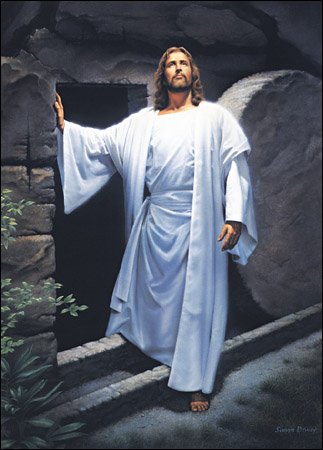 |
If early Christians were celebrating the Resurrection every single week, shouldn't we do likewise? So often we hear in Christian congregations that we are keeping the seventh day holy, but that would be true only if worshiping on Saturday. Surely we should understand, especially when partaking of the sacrament of the Lord's Supper on Sunday, that we are remembering not only the Savior's suffering and death but also His resurrection.
So the answer is yes, it was very important to celebrate the Resurrection annually on Easter on a Sunday because that should be done to a lesser extent every Sunday. But which Sunday?
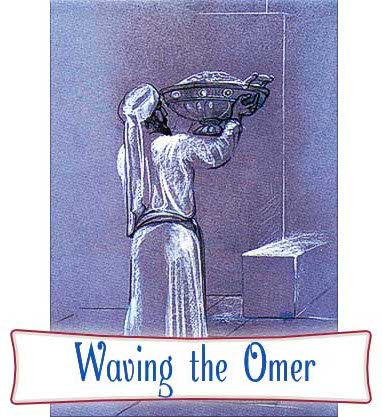 |
At the time of Christ there was a dispute about the correct day on which to offer the firstfruits. The law of Moses specified that it be offered during Passover week on the morning following the "sabbath" (Lev. 23:10-11). The Sadducees understood the word "sabbath" to mean Saturday, the weekly sabbath, and so they offered the firstfruits on Sunday morning during Passover week. The Pharisees, on the other (left) hand, understood "sabbath" to mean the actual day of Passover which was always a holy day of rest no matter what day of the week it fell on. Because Passover week (also called the Feast of Unleavened Bread) began on 15 Nisan (the first month, in the spring), they always made the offering on 16 Nisan. Modern Hebrews have followed the Pharisaic tradition. All of the evidence discovered in my work supports the Sadducees' interpretation: the correct day for the Waving of the Omer was indeed always on the Sunday after Passover.
In the month of the Resurrection, both Pharisees and Sadducees agreed on the day of the Waving of the Omer because the Sunday after Passover fell on 16 Nisan. Jesus was crucified on Fri 14 Nisan (1 Apr), the day for sacrificing the Passover lamb in the afternoon. He was in the heart of the earth on Sat 15 Nisan (Passover, 2 Apr) and resurrected before dawn on Sun 16 Nisan (3 Apr).
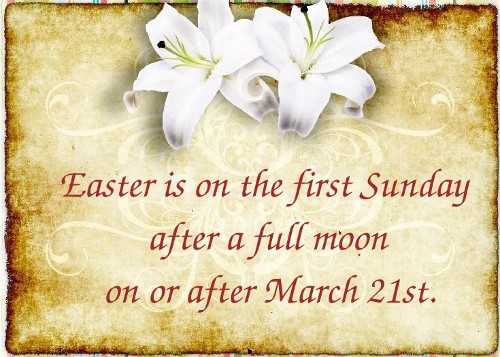 |
It is believed that the way the lunar month of Nisan was determined at that time was such that Passover (15 Nisan) fell on or after the full moon of spring. Thus, to mimic this idea, the council chose to celebrate Easter on the Sunday after the full moon on or after the spring equinox (assumed to be 21 Mar). We still follow that tradition, so Easter is on the first Sunday after a full moon on or after 21 Mar. Thus, the earliest possible date of Easter is Sun 22 Mar, which can occur if the full moon is on Sat 21 Mar.
Whether the council knew it or not, their formula agrees with the day for Easter (Waving of the Omer) on the Hebrew Calendar in almost every case. All of this explanation was really to show that we are celebrating Easter on the right day! In fact, it is more correct even than the traditional Hebrew Calendar, which can be off by as much as a month as it is this very year. Easter this year falls on Sun 27 Mar, which is the first Sunday after the full moon on 23 Mar. But the Hebrew Passover this year falls on Sat 23 Apr, a full month late. Is was such errors that led to the Perpetual Hebrew Calendar being developed in my work to correct them.
In my early articles, the Sunday after Passover on the Hebrew calendar was referred to as the Waving of the Omer. Later, when it became clear that that day on the (Perpetual) Hebrew Calendar is really the correct Hebrew day to celebrate the Resurrection, my articles began referring to that day as Easter on the Hebrew Calendar. It just seems simpler, more accurate, and needs less explanation.
After that lengthy introduction, let us now turn to what makes this coming Easter so special. There are currently fourteen sacred calendars known to me. Each has a holy day for the celebration of the Resurrection. Most of the holy days are actually associated with steps of life, so there is a holy day for conception, birth, death, etc.[3] One of the most important of those days represents resurrection as a day in the life of all mankind, just as birth and death.
 |
 |
How often does Easter Sunday fall on the day 1 Reed? We can easily calculate how often we might expect that to occur. There is one Easter Sunday every year and it can fall on any one of the 260 days of the Sacred Round. Thus, we'd expect Easter Sunday to coincide with 1 Reed about once every 260 years, or about twice in 500 years.
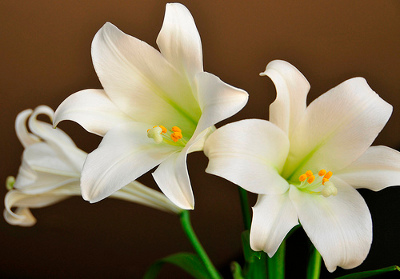 |
The two dates in 500 years with Easter Sunday on 1 Reed are: Sun 15 Apr 2001 and Sun 27 Mar 2016.
The first of those dates was noticed beforehand by this author and an Easter morning sunrise service was held for a hundred people or so to celebrate it. At that time my first articles on the Venus Calendar[4] and also on the Sacred Round[5] were published. My feeling at the time was that it was some sort of opening day of the Millennium on the Sacred Round and/or Venus Calendar. It was also the beginning of my publishing the importance of both the Venus Calendar and of the Sacred Round, both of which are very important to Native Americans. Both of those calendars are now both much better understood and are beginning to be more appreciated. Moreover, the meeting was held in Lehi, Utah, which seemed significant as representing the promised land of Lehi. Click here to see the program and a list of attendees.
It probably also should be mentioned that at the time of that event it was not known that Reed symbolized the Resurrection. It was important only as being the birthday of the Savior. So with that new understanding the date is even more significant.
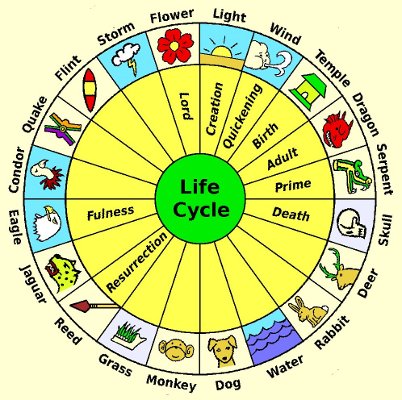 |
The Venus Calendar is closely associated with the Sacred Round, insomuch that all of the holy days on the Venus Calendar occur either on day 1 or 13 on the Sacred Round. There are only nine holy days on the Venus Calendar which fall on a day "1", and only one of them represents resurrection. That one day in the entire 585-day Venus Cycle is called 1 Resurrection. So now we can ask, how often does Easter fall both on 1 Reed and also on 1 Resurrection?
Again the expected number of such Easters is easy to estimate. There is one Easter every year, which can fall on any day on the Venus Calendar. Thus, once every 585 years we can expect Easter to occur on 1 Resurrection. Because that day can fall on any of 20 different pictures, only one Easter in 20 of those would fall on 1 Reed. So we expect only 1 in 585 x 20 = 11,700 Easters to occur both on 1 Reed and also on 1 Resurrection! With odds like that we would not be surprised if there were not even one such Easter in the 7,000 years after Adam (which is called "all of history" in this article)!
After doing an exhaustive search of each of those 7,000 years, it turned out there is exactly one such Easter. It was the first one found above, occurring on Sun 15 Apr 2001! That was the only one in all of history. To have it occur so near the beginning of the seventh millennium since Adam is what made it worth holding a gathering to celebrate.
Only this morning did it occur to me to check for another alignment. On the Venus Calendar Jesus was born on the day 1 Lord, symbolic of becoming one with God. It is the last step in the cycle of life represented on the sacred calendars. So now let us ask how often does Easter fall on 1 Reed and also on 1 Lord, both of which days coincided with the Savior's birthday on the evening preceding Thu 6 Apr 1 BC.
The expected number of such Easters is again one in 11,700 years for the same reasons as above noted. Doing the exhaustive search again resulted in one Easter during the 7,000 years after Adam. That one Easter in all of history is this coming Easter Sunday: 27 Mar 2016!
Easter is often the day each year that is holy on the most number of sacred calendars because the sacred calendars are set up to align on holy days as much as possible, especially on Easter. This Easter is also a holy day on four other sacred calendars: 1 Birth (Mercury and Uniform Mercury), 1 Maaziah (Priest, if before noon), and 1 Winter (Uniform Enoch). Thus, on the two Mercury calendars this Easter also falls on 1 Birth, the one day in their 117-day cycles which represents birth. Thus, this Easter is extremely symbolic of both the birth and resurrection of Jesus Christ.
This coming Easter is an amazingly unique Easter in all of history. It occurs on 1 Reed on the Sacred Round, which both symbolizes the Resurrection and was also the day on which Jesus Christ was born. Moreover, the day is also 1 Lord on the Venus Calendar which was also the Savior's birthday on that calendar. Those days are so rare that not even one Easter that coincides with both 1 Reed and 1 Lord is expected to occur in the 7,000 years since Adam. Indeed, this Easter is the only such occurrence in that interval. Those wishing to have a special home celebration might wish to use a short suggested program found here. Hopefully this announcement is being made in time to have an extra special Easter this year to celebrate both the birth and resurrection of Jesus Christ.